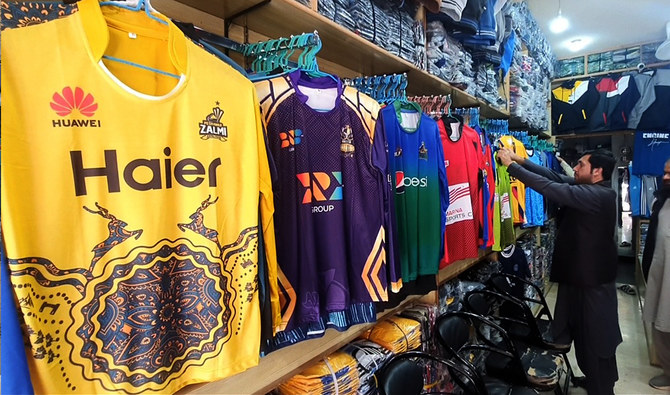QUETTA: Cricket fans in Pakistan’s southwest province of Balochistan are flocking to sporting goods stores during the ongoing eighth edition of a national T20 cricket league, with vendors at the province’s largest sports market boasting of a rise in both sales and new customers this season.
Finishing champions in Pakistan Super League 2019 and runners-up twice before, the Quetta Gladiators franchise is fueling a cricket craze in a province largely starved of sporting entertainment due to political unrest and a decades-long separatist insurgency that has rendered large gatherings vulnerable to security threats.
But a PSL exhibition match between Peshawar Zalmi and Quetta Gladiators at Quetta’s Akbar Bugti Stadium earlier this month, ahead of the official launch of this year’s edition of the series, marked the return of cricket to Balochistan after 26 long years. And shopkeepers at a sprawling sports market on Gurdat Singh Road in the provincial capital of Quetta said customers started coming in search of their favorite franchise kits and other sports gear even before the tournament officially began last week.
“We wait for the new cricket uniforms of the teams playing in the PSL, and after the release of the new designs we order [the] uniforms at our shop from Karachi and Sialkot,” shop owner Muhammad Zareef told Arab News, referring to cities where the country’s largest commercial sports markets are based.
“Majority of sports loving citizens buy Quetta Gladiator shirts but a large number of customers come here for Peshawar Zalmi and Lahore Qalandars’ shirts [as well].”
Indeed, since its launch in 2016, PSL has brought forth many riveting on-field rivalries, foremost among them the contest between Quetta Gladiators and Peshawar Zalmi that has kept fans at the edge of their seats.
On Monday, Peshawar hammered Quetta Gladiators by four wickets in the ninth game of the season in Karachi.
Hamadullah, 20, who only gave his first name, said he lived in Khanozai in Pishin district some 77 kilometers away from Quetta but made the journey to the capital city just to buy a Peshawar Zalmi shirt.
“I am a big fan of Peshawar Zalmi and support [skipper] Babar Azam,” he said.
Games between Peshawar and Quetta were “interesting” because of the “regional rivalry,” Hamadullah added, and because of Babar Azam, the first Pakistani to win the ICC ODI cricketer of the year award and captain of the men’s national cricket team in all formats.
Nawaz Baloch, a cricket trainer at Quetta’s local cricket academy, called PSL a “cricket boosting” event nationwide and lauded the effect it had on young cricketers in Balochistan.
“This [tournament] impacts all of Pakistan, it is an event which entertains all the cricket enthusiasts and our academies see huge footfall, raising the chances to discover new cricketers,” Baloch told Arab News. “This event makes an impression on the entire country, not just Quetta.”
Baloch said he hoped PCB would host PSL matches in Quetta in the next season, bringing even more joy for cricket fans in Balochistan.
Abdul Sattar, a Quetta Gladiators fan, echoed the sentiment.
“I came to the market today and it is very crowded,” he told Arab News as he bought his Gladiators’ jersey. “I support Quetta because I belong to Quetta. We are very happy for PSL, the youth here are very passionate about PSL.”
Shopkeeper Zareef agreed.
“Young boys and even small children come in large numbers to the market,” he said. “They bug their fathers to buy them the new PSL kits.”
















